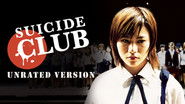ironhorse_iv
In Japanese culture, there has always been a morbid curiosity when it comes to the topic of suicide. The reason for this, is because, it's so intertwined with their country's history; both in ritual honorable ways, or in disturbing cowardice habits. It's an intriguing topic that Japan can't ignored. So, it was no surprised, that a movie was create to help, explore, why people commit to, such tragic acts. Suicide Club, also known as Suicide Circle, tells the story of a team of police detectives, trying to unravel the mystery on why 54 high school girls commit suicide, by throwing themselves in front of an oncoming subway train. What, they don't know, is this appears to be only the beginning of a string of suicides around the country. Can the detectives figure out, what's going on, or will the death toll, rise to new heights? Watch the movie to find out, if you want to! Without spoiling the movie, too much, suicide has always never easy topic to discuss. However, this movie doesn't know, how to tackle, such a complex topic like that. Written and directed by Sion Sono, the movie is not as thought-provoking as it could had, because the movie plays it, over the top, offensively silly. In this movie, a number of characters take their own lives in the most gruesome and outlandish ways. It's M Night Shyamalan, 2008's 'Happening' type of action, bad. I really couldn't take, this movie, seriously. All the suicides show in the film, are highly exaggerated, cheesy gory and goofy-looking. It doesn't help that the English subtitles are somewhat amusing, due to the language-barrier. Not only that; but the musical numbers by the 'Rocky Horror Show' reject, Genesis (Rolly Teranishi) & the preteen J-POP band, Dessert was somewhat jarring. It really doesn't match, well with semi-gritty approach of the rest of the film. The movie is directionless. There wasn't any realistic strong characters to follow. The detectives are really clueless in their jobs, and rarely any help in the movie. The whole sub-plot of the teenager hacker named 'the Bat' AKA Kiyoko (Yoko Kamon) trying to find the source of a web-site, keeping tabs on all the deaths is really out of place, and seem like, a waste of time. The people committing the suicide really doesn't add much, to the backstory nor does the movie never explain, why they suddenly felt, like killing themselves. It's seem very unrealistic that such a mass of suicides is even that possible. While, yes, there has been a rapid increase in suicides in Japan since the 1990s. Nevertheless, the number of suicides committed has been declining, since then and has been under, a few thousand, in three consecutive years. Also, the vast majority of people, more likely to kill themselves in Japan, are older men, not young women; movie! Although women attempt suicide about three times more often than men, men complete suicide about three times more often than women. The reason for this, is because, historically, Japan has been a male-dominated society, with strong family ties and correlating social expectations; however, in the 21st century, it brought about the death of the "jobs-for-life" culture has left these heads of families unexpectedly struggling with job insecurity or the stigma of unemployment. While there is a common perception that suicide rates are highest among the young, the elderly, in fact, have the highest suicide rates, everywhere with hanging being the leading method of suicide worldwide. A lot less, gory or bloody, than the film wants us to think. Honestly, what is this movie trying to convey with its message? Its seem like movie tries really hard to hint, that it might have to do with something with a subliminal message in music or a supernatural mind control that popular fab does, however, it's come across, way too vague, and without any kind of coherence. Even the Japanese DVD that come with extras that kinda explain the symbolism from each scene is little to no help. However, I do have a theory in what the movie message was. In my opinion, it was about 'connection' and how you live life. It's about the bonds, we share with our family, our friends, and even strangers. Basically, if one choose to dies, it break the chain, and a little part of us, die, a little, because of it. The movie shows, how people dealt with this lose. One can choose to follow, and continue the cycle of death, by return, killing themselves, or one can choose to break the cycle, and choose to live for themselves or for others. So in the end, it's a question of attachment. This is somewhat, what represented by the skin-roll. I just wish, the movie explain more. I really didn't like, that movie had to, had a prequel, 2005's Noriko's Dinner Table, just to help explain this. I know, that two versions of the film exist: an R-rated and an unrated version. The unrated version has six gory additions. The extended cut is somewhat, harder to watch, due to the disturbing imagery. Overall: I know, Japanese society's attitude toward suicide movie has been termed "tolerant"; however, as an Asian-American westerner, I find the movie, somewhat offensive and tasteless. I like movie about suicide that may help save some people's lives. In my opinion, this movie doesn't do that, well. Instead, of helping people, this movie makes suicide look fun by making it seem like it mostly painless to complete. In my opinion, films like this, can only triggers disturb copy-cats to followers. I have to say, the movie doesn't do much, but shamefully exploits suicide. Sadly, I wish this movie was about the three 19th century detective fiction short stories by Robert Louis Stevenson, instead.






